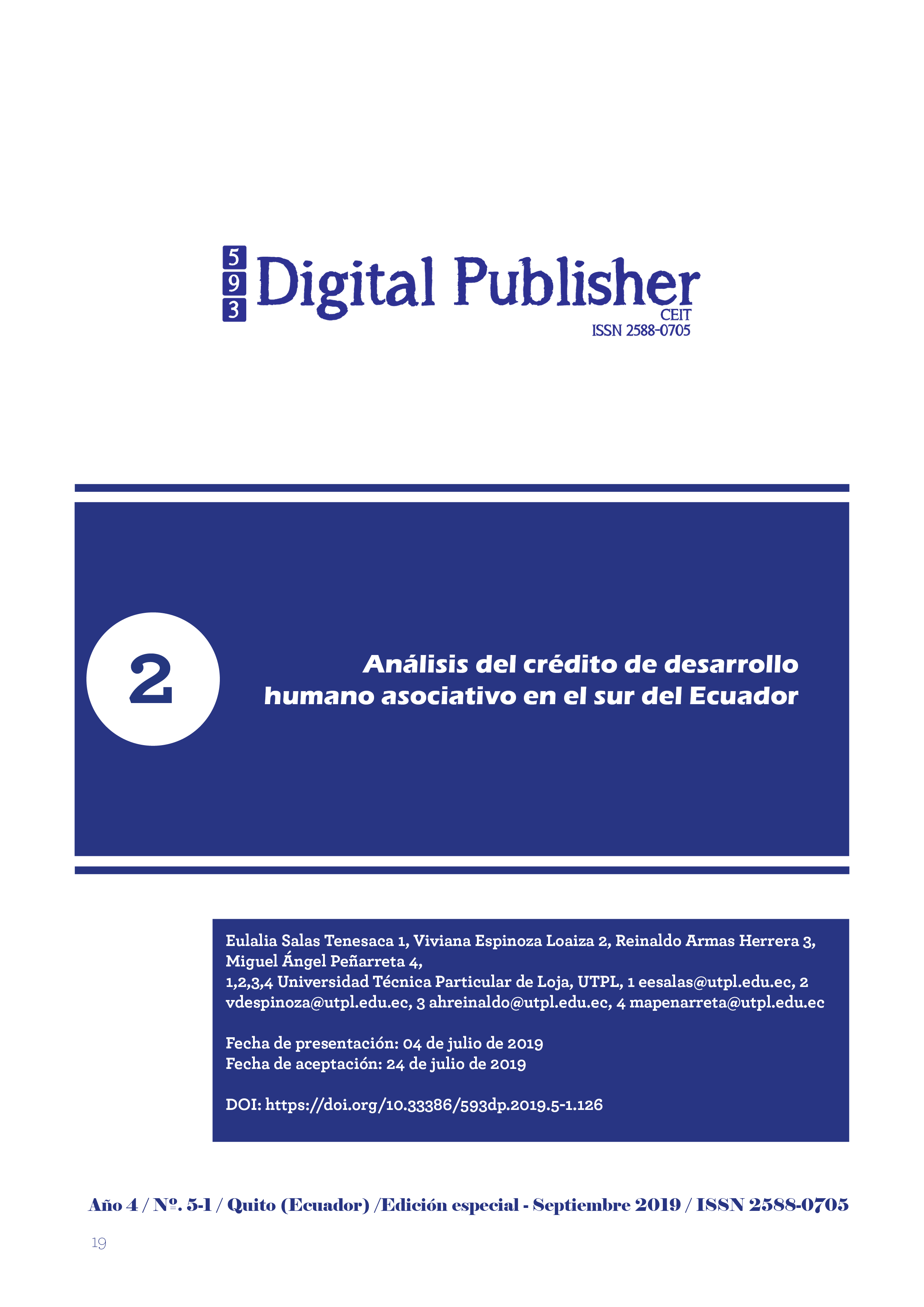Análisis del crédito de desarrollo humano asociativo en el sur del Ecuador
Contenido principal del artículo
Resumen
El presente trabajo tiene como objetivo evaluar la eficacia del crédito de desarrollo humano asociativo (CDHA), tomando como variable de análisis la satisfacción de los beneficiarios respecto de esta política social. Para llevar a cabo esta investigación se aplicó una encuesta estructurada a un total de 209 mujeres beneficiarias del CDHA ubicadas en 52 barrios que pertenecen a la zona rural de la ciudad de Loja. A través de un modelo Probit se pudo determinar cómo resultados más relevantes que a mayor nivel de educación, la probabilidad de presentar mayor grado de satisfacción aumenta, lo mismo ocurre con las mujeres de estado civil divorciadas, quienes tienen una mejor probabilidad de tener más satisfacción que aquellas de estado civil soltero. Las otras variables demográficas no explican el grado de satisfacción.
Descargas
Detalles del artículo
1. Derechos de autor
Las obras que se publican en 593 Digital Publisher CEIT están sujetas a los siguientes términos:
1.1. 593 Digital Publisher CEIT, conserva los derechos patrimoniales (copyright) de las obras publicadas, favorece y permite la reutilización de las mismas bajo la licencia Licencia Creative Commons 4.0 de Reconocimiento-NoComercial-CompartirIgual 4.0, por lo cual se pueden copiar, usar, difundir, transmitir y exponer públicamente, siempre que:
1.1.a. Se cite la autoría y fuente original de su publicación (revista, editorial, URL).
1.1.b. No se usen para fines comerciales u onerosos.
1.1.c. Se mencione la existencia y especificaciones de esta licencia de uso.
Citas
Béjar Rivera, H. (2014). Justicia Social, Política Social (Milagros Varela Gómez ed.). Lima, Lima, Perú: Derrama Magisterial.
Bermeo, F. (2013). De las transferencias monetarias al sistema nacional de inclusión y equidad social en: Hacia una reforma del bono de desarrollo humano. Quito: Abya-Yala.
Coba, E., & Diaz, J. (2014). El credito de desarrollo humano asociativo en la economia social y solidaria de la provincia de Tungurahua-Ecuador. Analitika, 46.
Coraggio, J. L. (1999). Política social y economía del trabajo alternativas a la política neoliberal para la ciudad. MAdrid.
De Laubier, P. (1984). La Politique sociale dans les societés industrielles. 1800 á nos tours, París, Economica.
Díaz, C. (1998). El ciclo de las políticas públicas locales: notas para su abordaje y reconstrucción. Obtenido de http://www.eumed.net: http://www.eumed.net/libros-gratis/2014/1402/ciclo-politicas-publicas.htm
Echecopar, G., Angelelli, P., Galleguillos, G., & Schorr, M. (2006). Capital semilla para el financiamiento de las nuevas empresas: Avances y lecciones aprendidas en América Latina. Washington
Esping-Andersen, G. (1990). The three worlds of welfare capitalism. New Jersey.
Fernández Riquelme, S. (2011). Política Social y Desarrollo Humano. La Nueva Cuestión Social del Siglo XXI. Revista crítica de Ciencias Sociales y Jurídicas, 29-51. Obtenido de http://pendientedemigracion.ucm.es/info/nomadas/29/sergiofriquelme.pdf
Fleury, S. (1994). Estado sem cidadãos seguridade social na América Latina. Rio de JAneiro: Fiocruz.
MIES. (s.f.). MIES. Recuperado el 19 de Noviembre de 2015, de MIES: http://www.inclusion.gob.ec/quienes-somos-que-es-cdh/
Park, Hun Myoung. 2009. Regression Models for Binary Dependent Variables Using Stata, SAS, R, LIMDEP, and SPSS. Working Paper. The University Information Technology Services (UITS) Center for Statistical and Mathematical Computing, Indiana University
Ponce, J., Enríquez, F., Molyneux, M., & Thomson, M. (2013). Hacia una reforma del Bono de Desarrollo Humano. Quito: Flacson.
Salas, E., Espinoza, V., Samaniego , A., & Martínez-Fernández, V.-A. (2016). Inclusión Financiera a través del crédito de desarrollo humano como herramienta para el fomento de capacidades y emprendimiento. En Experiencias en la modelación de la toma de decisiones en la salud humana, medio ambiente y desarrollo humano (págs. 89-103). España.
Schumpeter, J. (1976). Teoría del Desarrollo Económico. México: FCE.

